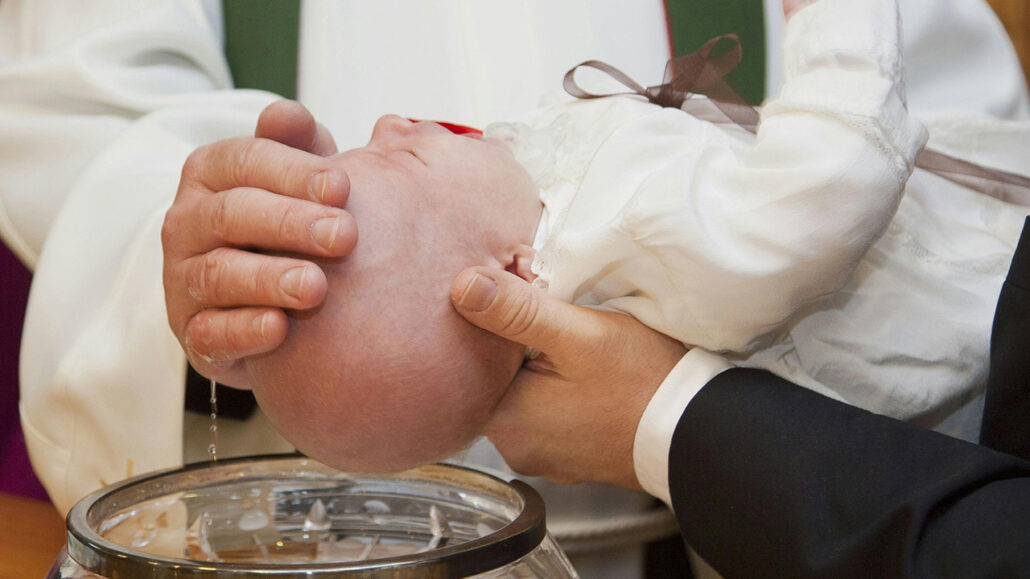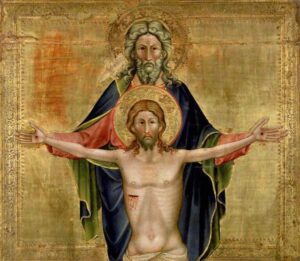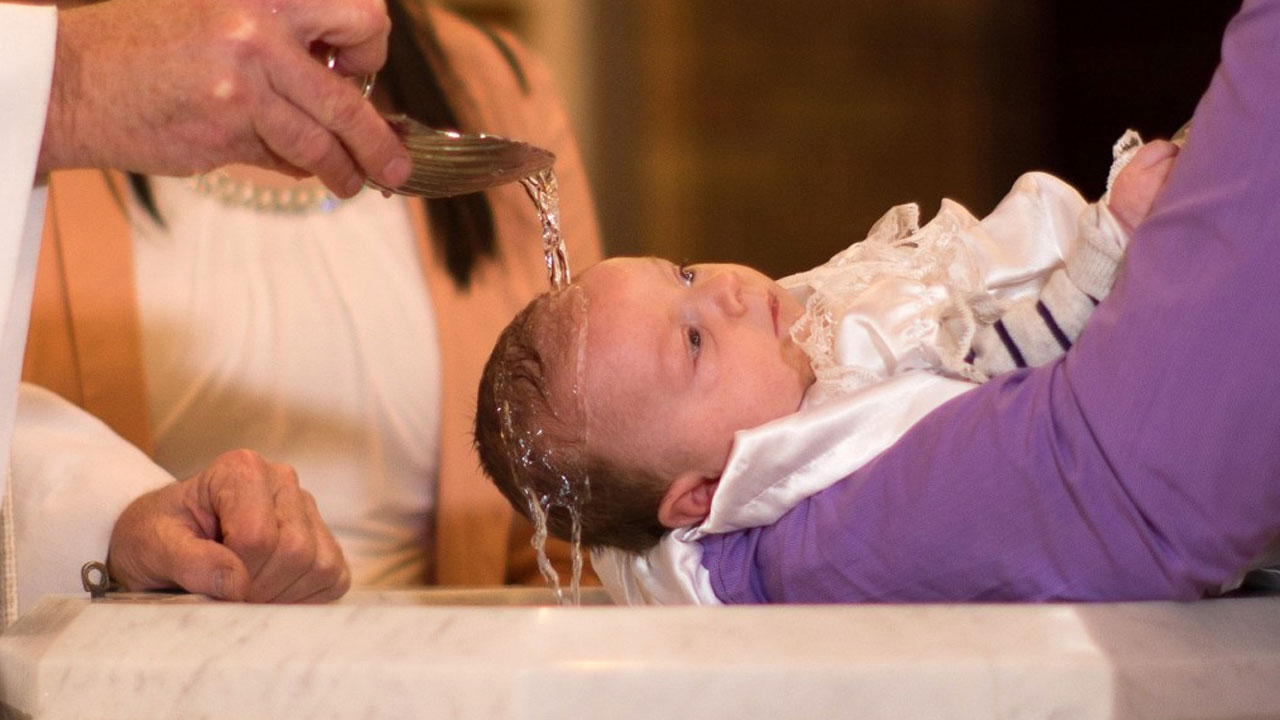Questions:
Many sects are opposed to infant baptism, and often ask Catholics where in the Bible it says that infants can or should be baptized. Regarding this issue, there are many Catholics who do not know how to answer. For example, a young Catholic mother married to a Protestant wrote to me:
I am Catholic, and my husband is a Pentecostal; he wants me to see the truth in his church, and I want him to see that the Catholic Church is the one true Church, but I don’t know how to prove it to him. He always relies on the Bible, and he says we don’t. I go to his church sometimes and I realize that his doctrine is a little bit wrong, because they don’t believe in the Trinity or in saints, and even less in the Virgin. We have an 8 month old son, and I want to baptize him, but my husband wants him to decide when he grows up. I don’t know what to do to show him that we should baptize babies.
Response:
We have already insisted that not everything has to be in the Bible, since this is only one of the two sources of Revelation, together with Tradition, which transmits, among other things, the same revealed text (the Bible). In any case, there are biblical testimonies, even if they are not direct.
Let us say, first of all, that indeed the Church holds as of definite faith that “the baptism of infants who do not have the use of reason is valid and licit”. The magisterium had to define this only at the Council of Trent (16th century), when one of the first sects to emerge from the Lutheran reform, the Anabaptists (also known as “rebaptized”), introduced the custom of repeating baptism when the individual reached the use of reason (by denying the validity of their baptism while they were infants). (Before them, the Waldensians and the Petrobrusians had also denied the capacity of infants to receive baptism in the 12th century, but without such repercussions). The Reformers themselves preserved the baptism of children under the influence of the Christian tradition, although such baptism was incompatible with their conception of the sacraments (which always demanded a conscious act on the part of the one who received it). Luther attempted to resolve the difficulty by arbitrarily supposing that, at the moment of baptism, God miraculously enables the infants to perform a justifying act of fiducial faith. Some modern Protestants, such as Karl Barth, have criticized this practice (and hence, against the same Protestant practice), demanding to correct this contradiction that is verified within Protestantism and to substitute the current baptism of infants for another accepted with responsibility on the part of the baptized.
For Catholic doctrine, the personal act of faith of the one who is baptized is not necessary when he or she is a child, just as in a person who is severely mentally ill and does not have and will never have the use of reason, because God requires of each person, for his salvation, the acts of which one is capable by their particular nature (therefore, an adult who has reached the use of reason without being baptized, cannot be validly baptized if he or she does not make a free and personal act of faith. But this does not happen with the child, because a child, by nature – that is, at their current age – is incapable of such an act). It is not that an act of faith is not necessary, but this is not necessarily a personal act of the child who receives baptism, but it is the act of faith of the Church. This is why in the rite of baptism of children, parents and godparents are asked, at the moment before baptizing the infant (and after having been all (parents and godparents and witnesses) questioned about the Catholic faith): “Do you want N. N. to be baptized in the faith of the Church that we have just professed together?”.
Sacred Scripture does not allow us to prove with complete certainty, but with great probability, the fact of the baptism of the infants. When St. Paul (cf. 1 Cor 1:16) and the Acts of the Apostles (16:15,33; 18:8; cf. 11:14) repeatedly speak to us of the baptism of an entire “household” (i.e. family), we must understand that the word “household” includes also the little children, or at least we cannot deny it (where does it say that in that family there were no little children or that they were not baptized?)
This is further reinforced by the fact that baptism was considered by the early Christians (including the apostles) as a substitute for the rite of circumcision (St. Paul speaks of the circumcision of Christ, for example in Col 2:11), which was practiced on infants a few days after birth. Likewise, the initiation of proselytes in late Judaism was also practiced with infants.
According to Acts 2:38 and following, the gift of the Holy Spirit, which is received through baptism, was promised not only to Peter’s hearers but also to their children. Naturally, by children one can consider in a broad sense, all the descendants of those who were listening to the apostle.
What is the theological reason to maintain that children without the use of reason (infants), despite not being able to make an act of personal faith, validly receive baptism? This is based on the objective efficacy of the sacraments and is justified by the universal salvific will of God (cf. 1 Tim 2:4), which also extends to children who have not reached the use of reason (cf. Mt 19:14), and by the necessity of baptism for salvation (cf. Jn 3:59).
Some use the text of 1 Corinthians 7:14 as an objection against infant baptism. There St. Paul says: For the unbelieving husband is made holy through his wife, and the unbelieving wife is made holy through her husband. Otherwise, your children would be unclean, but as it is, they are holy. Since here St. Paul calls “holy” the children of mixed marriages (between Christian and pagan), it does not allow us to conclude that these children do not need to be baptized, just as no one understands in the same verse that the pagan spouse is automatically sanctified by marrying a Christian spouse, and therefore does not need to be baptized if he or she recognizes Christianity as the true religion.
If we go to the Christian tradition, we see that there are testimonies of infant baptism from the earliest times. For example, Polycarp, in the acts of his martyrdom (around the year 160) affirms: “Eighty and six years have I served Him”, with which it is deduced that Polycarp was baptized (to this the holy bishop of Smyrna refers) around the year 70 at a youthful age. St. Justin in his First Apology speaks of many men and women of sixty and seventy years of age “who have been Christ’s disciples from childhood”, that is to say that they were baptized as infants around the years 85 to 95 (when the apostle John was still alive).
According to Acts 2:38 and following, the gift of the Holy Spirit, which is received through baptism, was promised not only to Peter’s hearers but also to his children. By these can be understood, naturally, in a broad sense, all the descendants of those who were listening to the apostle.
What is the theological reason to sustain that children without the use of reason (infants), in spite of not being able to make an act of personal faith, validly receive baptism? Other direct testimonies of the ecclesiastical practice of baptizing infants are found in St. Irenaeus, Tertullian, Hippolytus of Rome, Origen and St. Cyprian, and in the early Christian epitaphs of the third century, some of which can be read in the catacombs of Rome to this day. Origen bases the practice of baptizing infants on the universality of original sin, and affirms that such a custom comes from the apostles. A Carthaginian synod presided over by Cyprian (between 251 and 253), disapproved of delaying the baptism of newborns until eight days after their birth, and gave as a reason that “none of those born can be denied the grace and mercy of God”. From the fourth century, especially in the East, the custom of delaying baptism until the age of maturity or even until the end of life began to appear. St. Gregory Nazianzen recommends as a general rule the age of three years. The controversies against the Pelagians led to a clearer knowledge of original sin and of the necessity of receiving baptism for salvation, which served to greatly extend the practice of baptizing small children.
Fr. Miguel A. Fuentes, IVE
This article is an excerpt from: Miguel A. Fuentes, ¿En dónde dice la Biblia que…?, Respondiendo las principales objeciones de las sectas y de los protestantes, EDVE, San Rafael 2005, pp. 171-177.
Bibliolography
- Hamman, El bautismo y la confirmación, Barcelona 1970;
- Torquebiau, Baptême en Occident, DDC, II, col. 110-174;
- Herman, Baptême en Orient, DDC, II, col. 174-201;
- Schmaus, Teología dogmática, tomo VI (Los sacramentos), Rialp, Madrid 1963;
- C. Didier, Le baptême des enfants. Considérations théologiques, en: “L’Ami du Clergé” 76 (1966), pp. 157-159; 193-200; 497-516.
Original post: Here
Another post: can someone else besides a priest or deacon baptize a child when there is no emergency?











